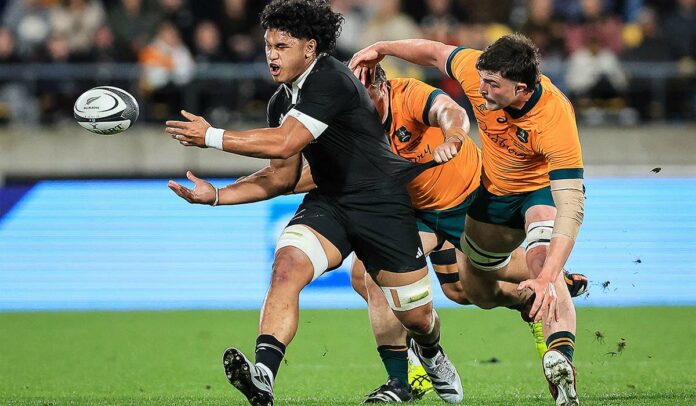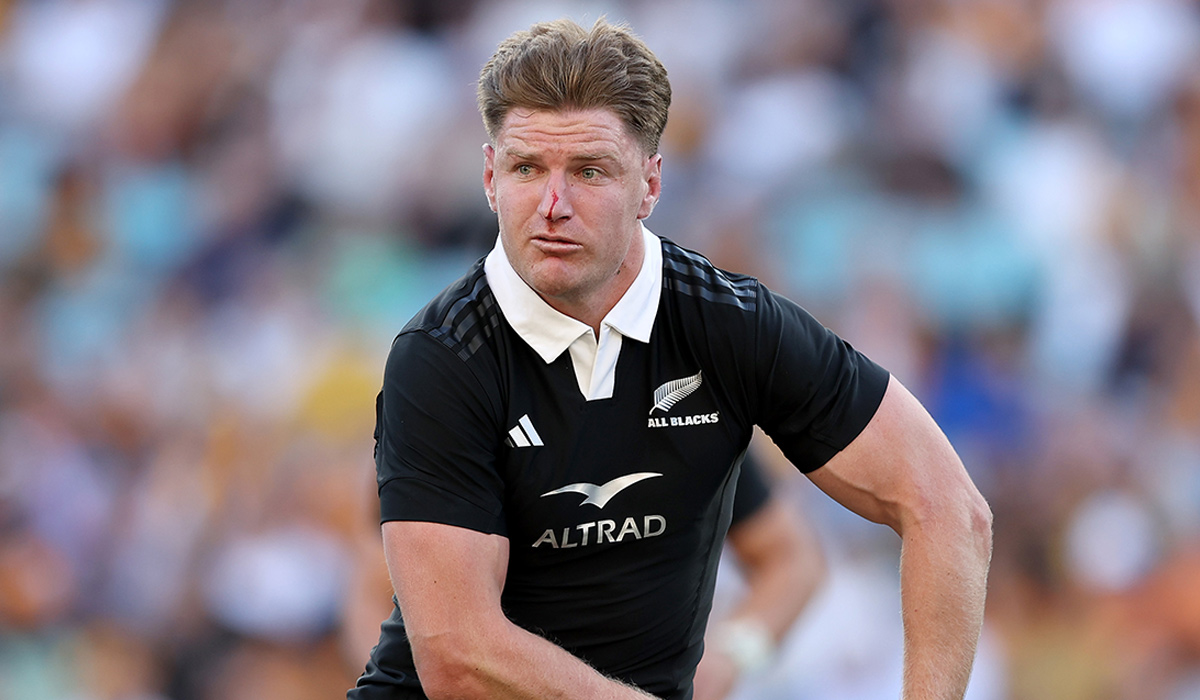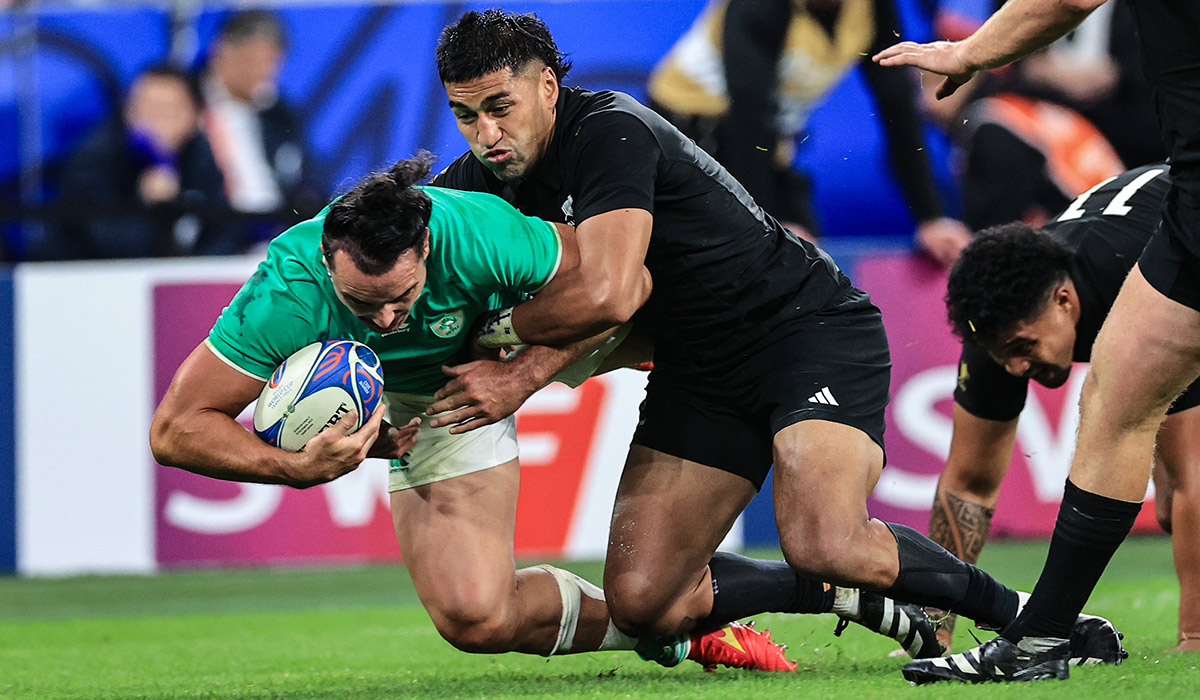
[ad_1]
When then All Blacks coach John Mitchell announced his touring squad ahead of the November internationals in 2001, there was no shortage of raised eyebrows in this part of the world.
New Zealand were set to visit the old Lansdowne Road, and there was a giddiness among supporters that the national team could finally break a century-old hex in this fixture.
There were a few reasons for this slightly misguided optimism.
Coach Scott Robertson of New Zealand looks on ahead of The Rugby Championship & Bledisloe Cup match between New Zealand All Blacks and Australia Wallabies at Sky Stadium. Pic: Hannah Peters/Getty Images
For starters, Warren Gatland’s side had just come off a brilliant win in a rearranged Six Nations fixture – due to the foot and mouth outbreak – against a juggernaut English side, the same team that would go on to claim World Cup glory a few years down the road.
And when Mitchell announced his squad, there were a lot of surprises. A new-look New Zealand would be heading for the northern hemisphere. An unknown quantity and perhaps a slightly vulnerable crew, too?
Icons and stalwarts such as Jeff Wilson, Christian Cullen and Taine Randall had been cut adrift as Mitchell announced a roster featuring 10 uncapped players. There were a few familiar stalwarts, with the likes of Jonah Lomu, Tana Umaga and Anton Oliver on board.
 Jordie Barrrett of the New Zealand All Blacks during The Rugby Championship & Bledisloe Cup match between Australia Wallabies and New Zealand All Blacks at Accor Stadium on September 21, 2024 in Sydney, Australia. Pic: Matt King/Getty Images
Jordie Barrrett of the New Zealand All Blacks during The Rugby Championship & Bledisloe Cup match between Australia Wallabies and New Zealand All Blacks at Accor Stadium on September 21, 2024 in Sydney, Australia. Pic: Matt King/Getty Images
But few people on this side of the equator knew much about all these new faces in the Kiwi camp.
‘This is an ideal opportunity to find out whether some of these players are capable of moving forward,’ Mitchell said at the time.
‘But, let’s get it right, the first priority is the Test 22 and that competition has been looked at in quite a lot of detail.
‘We will find out which players we would like to move forward with into 2002, and further to the World Cup.’
As it turns out, the new kids on the block weren’t half bad. The likes of Aaron Mauger, Chris Jack, Doug Howlett and Leon MacDonald would become Test stalwarts. A certain flanker from Canterbury by the name of Richie McCaw won his first cap against Ireland that November.
 Rugby World Cup France 2023 Quarter Final Stade de France St Denis Paris 14/10/2023 Ireland vs New Zealand All Blacks Ireland’s James Lowe is tackled by All Blacks Rieko Ioane. Pic: INPHO/Billy Stickland
Rugby World Cup France 2023 Quarter Final Stade de France St Denis Paris 14/10/2023 Ireland vs New Zealand All Blacks Ireland’s James Lowe is tackled by All Blacks Rieko Ioane. Pic: INPHO/Billy Stickland
For the record, the visitors survived a ferocious first-half blitz from an inspired Ireland before they moved up the gears and cruised to a 40-29 win in Dublin.
The No8 that day was Scott Robertson. Now, 23 years later, this laid-back, breakdancing surfer is bringing another much-changed squad to this part of the world.
Robertson succeeded Ian Foster after last year’s World Cup, and is in his first season at the All Blacks’ helm. ‘Razor’ was a popular appointment. Indeed, many people in his native land felt the former Crusaders backrower should have got the gig a lot sooner. When Steve Hansen left his post after the 2019 World Cup, he was widely tipped to get the call.
Instead, New Zealand rugby chiefs went for the succession strategy again with Foster, assistant during Hansen’s trophy-laden regime, stepping up.
Foster endured a rough stint and was feeling the heat for a long time. In the end, with the help of an old pal Joe Schmidt, he would guide an unfancied New Zealand side to the World Cup final.
Robertson, meanwhile, continued to add to his growing reputation, guiding the mighty Crusaders to seven successive Super Rugby titles. He would be linked to every big coaching vacancy in the game, from Leinster to England.
The 50-year-old bided his time and eventually got the call last year. But the step up from club to international hasn’t been seamless.
Robertson’s first season in charge began with a brace of narrow wins against a touring England before a shock home loss to Argentina, a last-gasp win in Australia and a pair of galling losses to the Springboks.
It’s been equally turbulent off the field, with MacDonald, who toured with Robertson in 2001 and went on to be a long-time team-mate and assistant coach, leaving the All Blacks set-up in August after having ‘different views’ with the All Blacks boss.
This is the most high-pressure job in world rugby and it’s fair to say that Robertson is feeling the pressure a bit ahead of this autumn tour, which includes clashes with England and Andy Farrell’s troops, who will be on a revenge mission after last year’s World Cup quarter-final defeat.
‘You only learn on the job. That’s one thing I understand now,’ Robertson recently said of the unforgiving Test arena.
‘You can do all the coaching you want but, until you get into position, that’s when you really learn.’
And just like Mitchell’s class of 2021, Robertson’s squad is brimming with names that will be unfamiliar to the casual observer on this side of the world.
There have been some big changes of late. Sam Whitelock and Brodie Retallick – the second-row titans – and brilliant scrum-half Aaron Smith have all retired, Leinster-bound midfielder Jordie Barrett is injured, while jet-heeled out-half Richie Mo’unga, who caused Ireland so many problems in Paris last year, is plying his trade in Japan and is thus out of the selection reckoning.
Irish fans will recognise the likes of Beauden Barrett, Sam Cane and Codie Taylor. Rieko Ioane is now infamous in these parts on the back of Johnny Sexton’s recent revelations in his book while Will Jordan is the best winger on the planet.
But few Irish people will have heard of Wallace Sititi, the powerful 22-year-old backrower who has enjoyed a breakout season on the blindside. Irish fans will know a lot more about the Chiefs flanker after the November 8 clash at Aviva Stadium.
Cam Roigard only has five caps to his name, but there is a lot of excitement about the 23-yearold Hurricanes scrum-half. Caleb Clarke is another raw talent with enormous potential. The Auckland Blues wing is a big unit and could cause Ireland all sorts of problems.
Tupou Vaa’i, Billy Proctor and Ruben Love are other low-key operators who can announce themselves on the world stage in the coming months.
Once again, New Zealand are in a phase of transition. History has taught us that is when the All Blacks are at their most dangerous. Results have been patchy, but you get the distinct sense that Robertson is building something and investing in a new squad.
Ireland and the rest of their rivals should be on high alert. This feels an awful lot like 2001 again.
[ad_2]
Copyright for syndicated content belongs to the linked Source link

